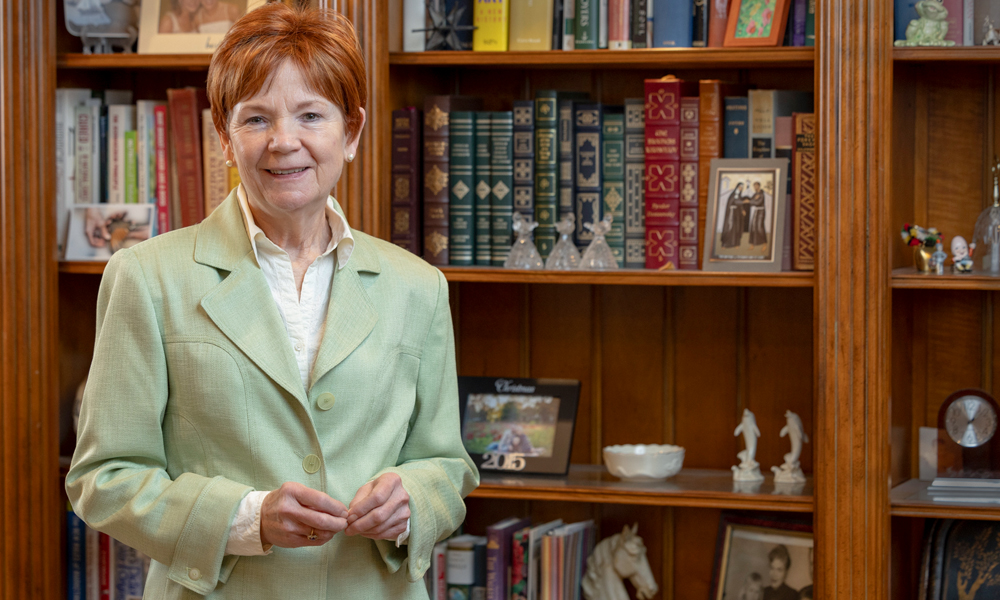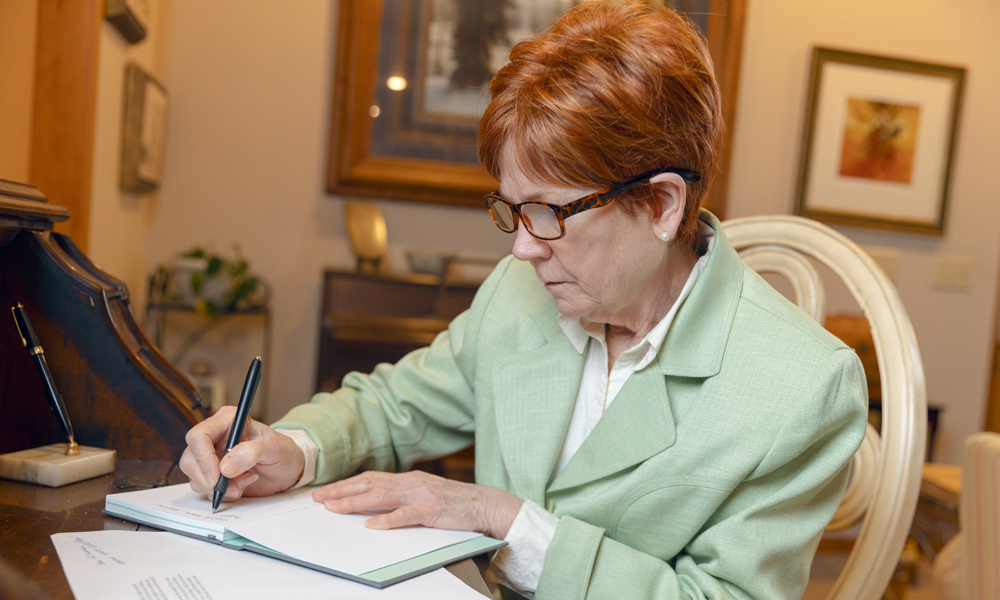Arkansas poet laureate lets her writing do the talking
Alumna believes verse can reach the depths of the human heart
JMU Headlines
SUMMARY: Award-winning author and Arkansas poet laureate, Suzanne Underwood Rhodes (’72), enjoys sharing the joy of poetry with her readers, clients, and students through her successful career as a prolific writer, editor, and teacher.
Suzanne Underwood Rhodes (’72), of Fayetteville, Arkansas, has been crafting poetry since she was 6 years old living in Arlington, Virginia. After a career of writing, editing, and teaching poetry and other forms of writing, she recently accepted a four-year term as Arkansas poet laureate, appointed by former Gov. Asa Hutchinson II. Now, traveling the state to speak about writing, she’s eager to show that poetry is for anyone.
“People are sometimes just put off automatically, because they think they don’t understand it,” Rhodes said. She disagrees, saying people probably understand poetry better than they think they do. After all, nearly everyone listens to music.
“I think that the musical aspect of poetry is very critical,” she said. Through rhythm, sound associations and imagery, writers can achieve an organic quality to their work that speaks to people.
“Being able to find that connection within your reader on different levels aesthetically is very important,” she said. “Beauty needs emotion with it too.”
That’s not to say poetry can’t be fun or silly. Rhodes, who recently returned home from a haiku convention in Hot Springs, Arkansas, and often entertains herself by writing limericks as she travels, wrote the following poem after noting a sign on the interstate for Alabam:
There’s an Arkansas town, Alabam,
whose founder forgot where he am.
When he yelled, “Roll Tide!”
his chest bursting with pride,
Alabam stuck like flies on a ham.
For Rhodes, poetry offers a way of giving context to her life.
“I think that poetry, more than any other art, has the greatest capacity to reach the depths of the human heart,” she said. “Words are rooted in divinity, as we read in John 1:1: ‘In the beginning was the Word, and the Word was with God, and the Word was God.’ Poetry has the ability to awaken the imagination, and through the imagination we can see more.”

Though Rhodes’ family and teachers encouraged her passion for writing from an early age, she was also greatly inspired by an English professor at Madison, Todd Zeiss, who taught an imaginative writing class and also guided her in an independent studies course.
“Everything he told me to do, I did,” she recalled. This included attending the Bread Loaf Writers’ Conference in Middlebury, Vermont, for two weeks. Bread Loaf is one of the nation’s oldest and most famous conferences of its kind, and so transformational to writers and students that it’s known as the “Magic Mountain.” Rhodes recalled meeting several well-known authors, including poet Diane Wakoski.
During her Madison days, Rhodes was editor of the literary journal Chrysalis and, at Zeiss’ urging, she entered one of her poems in a Virginia Commonwealth University poetry contest, winning first place. Zeiss invited Rhodes to return to Madison to speak after graduating.
Rhodes earned an English degree with a minor in Secondary Education. Planning to teach at the college level, she received a Master of Arts in the Writing Seminars of Johns Hopkins University.
She later taught creative writing at King University in Bristol, Tennessee, and St. Leo University in Florida, and has led poetry workshops for students ages 5 to 80. She now conducts remote poetry workshops and classes at The Muse Writers Center in Norfolk, Virginia, and she owns and operates a small, independent communications business, PR Flair.
This year, as part of her role as Arkansas poet laureate, she’s been leading poetry lessons at Magdalene Serenity House, a nonprofit organization that offers a two-year program to help women rebuild their lives following trauma, abuse, addiction or incarceration. “I was so pleased to be able to do that,” she said. “It’s one of the best things I’ve ever done in my life.”
She also received grant money from Artists 360, a program of the Mid-America Arts Alliance, with support from the Walton Family Foundation, which will help fund a book for the Magdalene writers to share with family, friends and the staff at the Serenity House.

Grateful to have poetry as such a big part of her career, Rhodes recalled the void she felt in one of her early jobs as a clerk typist. “A creative person needs to be around other creatives,” she said. So she made an appointment with Henry Taylor, a professor of literature and co-director of the Master of Fine Arts program in creative writing at American University, who helped her feel validated in her vocation as a poet. “Have to keep it alive,” she said.
Rhodes advises other artists to also find ways to incorporate their passion, even if it isn’t their primary focus. “Put things in place so that you can have support outlets for your creative work,” she said.
“Besides writing poems, I love revising my poems,” she said. “That’s where the obsession kicks in. To have the perfect word in the perfect place. I just encourage my students to be very serious about revision.”
Rhodes had her second full-length poetry collection, Flying Yellow, published in 2021 by Paraclete Press and won the 2022 North American Book Award of the Poetry Society of Virginia. She recently completed her third chapbook, Milk From the Moon, based on her experiences managing grief following her husband’s death in 2022. “Poems in this book are about loss,” she said. “Writing them was everything. It gave shape and meaning to my grief.” She has another chapbook — The Perfume of Pain — coming out in July 2024 through publisher Alabaster Leaves, an imprint of Kelsey Books.
Rhodes also writes essays, having published two books of lyrical prose, Sketches of Home and A Welcome Shore. The first one was written in the mountains of Tennessee and the second one after moving to Virginia Beach, Virginia.
“These reflected an internal landscape — the strength of the mountains and the freedom of the ocean,” she said. “The interior self has its own landscape: our memory, experience, impressions. All those things that make us human.”

